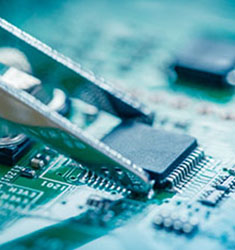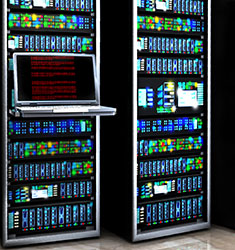Program Description
Electrical engineering is a diverse field that includes designing computers, robots,
wireless communications, medical devices, lasers, fiber optics, new electronic materials,
sensors, and so much more. Our faculty pursue cutting edge research in nanotechnology,
solar energy, smart grids, machine learning, rehabilitative prosthetics, neural networks,
brain-computer interfaces, wearable electronics, just to name a few.
The electrical engineering program will prepare you to join the next generation of
engineers, capable of becoming a leader in industry, government or academia. In addition
to electrical and computer engineering classes, you will also take computer science
classes, physics classes, and a number of math classes. Get a strong foundation in
our core electronics classes and labs and then choose a track that matches your interests
in the upper-level classes. All students complete a senior capstone project, which
further solidifies engineering concepts and prepares you to enter the workforce or
graduate school.
The Student Experience
We believe in hands-on experience, which is why we encourage students to get involved beyond our core lab classes and senior project. We offer research opportunities for undergraduates along with internship fairs to connect students with top engineering companies for summer work opportunities. We also encourage students to participate in student organizations, such as the U’s chapter of the Institute of Electrical and Electronics Engineers (IEEE) or Society of Women Engineers (SWE) program. You can also study abroad at our Asia campus, which offers many of the required classes for our degree.
Career Opportunities
Electrical engineers are highly sought after in industry and our industry partners are constantly asking us for more candidates. Many of our students go on to work for national labs, defense contractors, the telecommunications sector, big name tech companies, or even start their own company. Graduates of our program get hired not only as electrical engineers, but also hardware engineers, optical engineers, test engineers, controls engineers, RF engineers, and even software developers. You can also jumpstart your career with a graduate degree in electrical engineering through our BS-MS program, MS program, or PhD program.
More Info
- Department of Electrical & Computer Engineering
- Price College of Engineering
- Department Advising
- U Career Success
Catalog
Exploratory Classes
- ECE 1050 - Matlab for Electrical and Computer Engineering Design
- ECE 1240 - Circuits and Systems: Introduction
- ECE 1245 - Circuits and Systems Lab: Introduction
- ECE 1900 - Intro to Electrical & Computer Engineering
- ENGIN 1022 - Survey of Engineering

 Electrical Engineering
Electrical Engineering


